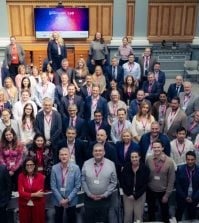Exclusive Global Government Forum research reveals five pillars of a modern civil service

Global Government Forum research has revealed the key characteristics needed in a modern public service, with priorities ranging across leadership, digital service delivery, workforce development, cross-departmental integration, and citizen trust.
The Making Government Work: Five pillars of a modern, effective civil service report is the result of interviews with 12 senior civil service leaders from around the world.
The research was undertaken to identify how public services are responding to unprecedented challenges.
It found that relationships between civil servants and ministers are becoming increasingly strained, with populist politics often making it difficult to speak truth to power. Officials find themselves torn between serving the requests of ministers seeking quick political solutions and upholding their “stewardship” function as public servants working in the nation’s long-term interest. Meanwhile, global pressures – such as conflicts, ageing populations, the transition to net zero and post-Covid economic recovery – are placing huge strain on public services.
Drawing on these interviews with government leaders – as well as an extensive body of wider Global Government Forum work – the research identifies five pillars that are key to making government work:
- Strong leadership with mutual respect and alignment between ministers and senior officials
- Building a highly skilled, inclusive and thriving public sector workforce.
- Fostering an agile, digital, and risk-taking culture focused on delivery.
- Implementing working structures that transcend organisational silos.
- Cultivating a service trusted by its users and the public.

The report also breaks down each of these pillars with four key points that can help civil services realise the principles.
Read in full: Making Government Work: Five pillars of a modern, effective civil service
The interviews were conducted by Lord Gus O’Donnell, the former UK Cabinet secretary and head of the civil service.
“The role of Cabinet secretary and head of the civil service can be a lonely one as our only serving peers can be found abroad,” said Lord O’Donnell. “That is why this initiative is so important – it allows for these leaders to share their challenges and insights candidly to help each other. Now, more than ever, we need to build a public service that can deliver for elected politicians and build capabilities that are in the long-term, public interest.”
Siobhan Benita, executive adviser at Global Government Forum, convened the interviews with civil service leaders alongside Lord O’Donnell.
She commented: “What struck me most from our interviews was not just the sheer scale and complexity of the challenges facing our civil servants – as daunting as they are – but also the increasingly thorny task of serving the elected politicians of the day whilst also providing stewardship of the institutions that serve the long-term interests of the public. And whilst technology and generative AI has the potential to rocket boost civil service productivity, it requires talent, pace and innovation that the public sector is currently struggling to embrace.”
The research highlights the potential for new technologies, especially generative AI, to boost efficiency but the report also finds that civil servants around the world are struggling to recruit tech talent, and are slow to understand, manage and deploy digital solutions.
Civil service leaders highlight the need for innovation in government to both unlock digital capabilities and enable the use of artificial intelligence, as well as the need to address structural barriers. Most governments are still organised around vertical policy departments which create barriers to collaboration and, ultimately, prevent the delivery of joined-up public services.
“We’re not going to change the overall structure anytime soon, but there are definite opportunities for stronger coordination, stronger data sharing, and better programme management,” one leader said, while another added: “We have horizontal problems and we have vertical organisations. The question I always like to ask is: whose job is it to wake up every day trying to resolve that fundamental disconnect?”
“For years, we have tried to do that through working groups and committees and council and I think we need to, at some point, just acknowledge those are not sufficient.”
Leaders in the report also highlighted the need to cultivate a service trusted by its users and the public, and to strengthen international alliances to bolster credibility and share best practices in civil service.
As one put it: “It’s a complicated working environment right now, honestly. It’s as complicated as anything I’ve seen in my professional career, and that has pretty significant effects.”
“The global situation is shifting significantly,” said another, who described dealing with this as “a preoccupation for government”.
Get the full analysis in the report: Making Government Work: Five pillars of a modern, effective civil service
This research builds on Global Government Forum’s annual Global Government Summit, which gathers the world’s foremost public sector leaders to discuss practical, actionable solutions. Leaders at this summit requested a comprehensive “blueprint” for government, aimed at consolidating and expanding the knowledge shared over the past decade. This report represents the first step in providing this essential assistance, to be followed by a best practice toolkit for each pillar.
The full list of interviewees who took part in this study is below. Participants represent the most senior, relevant civil service leader in each government system.
The interviews were conducted under the Chatham House Rule, so their comments could be quoted but not attributed.
Thank you to the leaders who took part in this study:
- Glyn Davis, secretary of the Department of the Prime Minister and Cabinet, Australia
- Donna Cadogan, head, public service, Barbados
- John Hannaford, clerk of the Privy Council and secretary to the Cabinet, Canada
- Taimar Peterkop, state secretary, Estonia
- Henrik Haapajärvi, former state secretary to the prime minister, Finland
- Claire Landais, secretary general of the government, France
- Haryomo Dwi Putranto, acting chair, Indonesian National Civil Service Agency, Indonesia
- John Callinan, secretary general of Department of Taoiseach and Government, Ireland
- Folasade Yemi-Esan, head of the civil service of the Federation, Nigeria (retired 14 August)
- Leo Yip, head of civil service and permanent secretary (Prime Minister’s Office), Singapore
- Simon Case, cabinet secretary and head of the civil service, United Kingdom
- Dustin Brown, deputy assistant director for Management, Office of Management and Budget, Executive Office of the President, United States (at time of interview).
About Richard Johnstone
Richard Johnstone is the executive editor of Global Government Forum, where he helps to produce editorial analysis and insight for the title’s audience of public servants around the world. Before joining GGF, he spent nearly five years at UK-based title Civil Service World, latterly as acting editor, and has worked in public policy journalism throughout his career.

Related Posts
Latest News
-
How governments are using mobile IDs to transform services for citizens
As governments around the world look to deliver digitally-enabled services,...
- Posted July 14, 2023
- 1
-
Public sector fintech moves up a gear as Dublin hosts fourth Global Government Fintech Lab
Financial technology’s ‘transformative potential’ for public sector transformation has been...
- Posted June 12, 2025
- 0
-
Canada to hit defence spending target ‘half a decade ahead of schedule’, PM says
Canada has set out plans to increase defence spending quicker...
- Posted June 12, 2025
- 0
-
From period pain to heart disease, the gender health gap is real – here’s how to close it
For decades, women’s health has been chronically underfunded and under-researched....
- Posted June 12, 2025
- 0
-
UK Spending Review sets out how government will make reform of the state happen
The UK government has set out how it will fund...
- Posted June 11, 2025
- 0
-
UK Spending Review 2025: live updates
Chancellor Rachel Reeves is setting out details of the UK...
- Posted June 11, 2025
- 0
-
Government structures ill-equipped to deliver climate-resilient infrastructure, report finds
Weak adaptation plans, undefined roles and responsibilities, and a lack...
- Posted June 10, 2025
- 0
-
Brazilian pilot explores letting citizens control – and sell – their personal data
A pilot project in Brazil will explore enabling citizens to...
- Posted June 10, 2025
- 0
Partner content



Related events

















